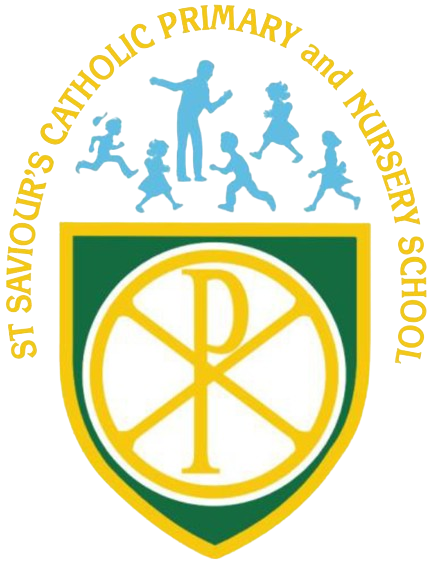Music
Intent (Why we learn music)
Music is a universal language that embodies one of the highest forms of creativity. (National Curriculum)
Music teaching at St Saviour’s Catholic Primary and Nursery School aims to follow the specifications of the National Curriculum. Through an engaging progressive and differentiated curriculum, children will be inspired to develop a lifelong love and appreciation of music and master a range of skills including: performing, listening, composing and appraising, that will support their future musical and holistic development.
- To be enthusiastic, inquisitive, lifelong learners: We aim to provide children with a strong foundation of musical skills that can be built upon and nurtured throughout children’s lives and future learning, children will participate in a range of engaging musical activities and performance opportunities, enabling them to foster an understanding and appreciation of a range of musical genres and composers from different times and cultures.
- To be strong communicators: we aim to develop children’s communication skills, confidence and self-esteem through a variety of performance opportunities, an awareness of the audience, express emotions using musical expression, to rehearse, perform with and listen to others.
- To be well-rounded, independent and resilient learners with aspirations: children will have the opportunity to challenge themselves by undertaking the study of new instruments and musical notation and develop a growth mind-set when faced with challenges along the way.
- To develop and use their God given talents by being creative: we aim to encourage every child to express themselves through music making so they can realise their individual creative potential.
- To be responsible citizens who are eager to make a positive contribution to their community and wider society: children will have the opportunity to collaborate in music making activities and performances within our school and wider community.
Children develop their reading skills within Music by following and analysing meaning and vocabulary of song lyrics. Singing aids reading fluency and encourages the use of expression and clear articulation. Reading musical notation promotes looking ahead when reading and scanning. Reading music engages both sides of the brain strengthening memory pathways. Children are encouraged to read and react to performance directions whilst performing. Children will have the opportunity to read about famous musicians and research the history of music.
Implementation (How we teach music)
The music curriculum from Year 1 to Year 6, is primarily delivered through weekly subject specialist teaching and is based on high expectations for all pupils. Music in EYFS is taught in regular planned sessions and includes, rhythms, rhymes, songs and playing un-tuned percussion instruments. Music teaching follows the key principles of the National Curriculum for Key Stage 1 and 2 and meets the suggested approaches of the Model Music Curriculum (singing, listening, composing, performance/ instrumental performance, the history of music) by following the progressive Sing Up Music scheme. This scheme enables music to be taught for depth and mastery so that our children are supported to reach at least age-related expectations.
Our music scheme planning covers a broad and diverse range of repertoire, approaches, and musical traditions. Sing Up Music scheme supports a fully-integrated approach to musical development, connecting the interrelated strands of singing, playing, improvising, composing, listening, and appraising.
SEN children are identified and supported through ‘Quality First’ teaching using differentiation of instruments, resources and tasks where necessary and appropriate scaffolds and support is given.
Progress is measured through Assessment for Learning, using the online Tapestry assessment record aid to track and monitor progress and termly summative assessments are recorded using the Sonar software package. This informs planning for future lessons and identifies where further individual or group support is needed.
The music subject leader will regularly monitor teaching and learning and listen and respond to pupil and staff voice. The subject lead receives up to date training so they have a clear understanding of their role and responsibility in curriculum design and delivery.
Children will have the opportunity to use technologies such as ‘Garage Band’, enabling the children to compose their own pieces electronically.
Pupils’ knowledge is built upon year-on-year, and they are taught how to sing fluently and expressively, play tuned and un-tuned instruments with accuracy and control. They will learn to recognise and name the interrelated dimensions of music: pitch, duration, tempo, timbre, structure, texture and dynamics and use these in their own composition and improvisations expressively.
Impact (As a result…)
The impact of our music curriculum can be seen in the pupil’s performances, understanding, knowledge and finished compositions; as well as in pupil data and through pupil voice. Everything we do has the child at the centre, and strong relationships are built between pupils and staff, which creates an atmosphere for learning which is conducive to success.
Progress is measured through Assessment for Learning, using the online Tapestry assessment record aid to track and monitor progress and termly summative assessments are recorded using the Sonar software package. This informs planning for future lessons and identifies where further individual or group support is needed.
Pupils not only leave St Saviour’s with a secure understanding of the music curriculum; but it also provides children with stimulating experiences and a range of subject specific and transferable skills that will remain with them throughout their future life learning journey.
